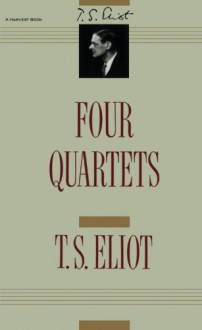
Four Quartets
The last major verse written by Nobel laureate T. S. Eliot, considered by Eliot himself to be his finest work Four Quartets is a rich composition that expands the spiritual vision introduced in “The Waste Land.” Here, in four linked poems (“Burnt Norton,” “East Coker,” “The Dry Salvages,” and...
show more
The last major verse written by Nobel laureate T. S. Eliot, considered by Eliot himself to be his finest work Four Quartets is a rich composition that expands the spiritual vision introduced in “The Waste Land.” Here, in four linked poems (“Burnt Norton,” “East Coker,” “The Dry Salvages,” and “Little Gidding”), spiritual, philosophical, and personal themes emerge through symbolic allusions and literary and religious references from both Eastern and Western thought. It is the culminating achievement by a man considered the greatest poet of the twentieth century and one of the seminal figures in the evolution of modernism.
show less
Format: paperback
ISBN:
9780156332255 (0156332256)
Publish date: 1968-03-20
Publisher: Mariner Books
Pages no: 64
Edition language: English
Category:
Classics,
Literature,
European Literature,
British Literature,
American,
20th Century,
Religion,
Philosophy,
Christianity,
Poetry,
Modern Classics

(Original Review, 1981-05-12)I’m always impressed by the influence of mediaeval mystical texts on 'Four Quartets'. This was the subject of a chapter in my thesis. These days, I would probably want to change some of the argument of that chapter, but I would not change the overall conviction that a pr...

bookshelves: radio-4, published-1943, winter-20132014, poetry, nobel-laureate, philosophy, religion Read from January 16 to 19, 2014 Sat 18/1/2014 R4Jeremy Irons reads TS Eliot's four linked meditations. BBC description: Four Quartets is the culminating achievement of T.S. Eliot's career as a p...

Caution : this is a 5 stars rating ,( obviously like everybody here on Goodreads ) the rest of the stars are coming along when I understand what does this poetry mean , or when my mind evolve to understand such a poetry :)

"Time present and time past/ Are both perhaps present in time future,/ And time future contained in time past.""Time past and time future/ What might have been and what has been/ Point to one end, which is always present.""In my beginning is my end. In my end is my beginning.""What we call the begin...

Question 1 (5 points)Contrast the treatment of denotation and reference in the following works:- Ludwig Wittgenstein, Philosophical Investigations- T.S. Eliot, Four Quartets- Marcel Proust, A L'Ombre Des Jeunes Filles En FleursWell, that's what I think's wrong with formal examinations.______________...






 6 years ago
6 years ago




 16 years ago
16 years ago